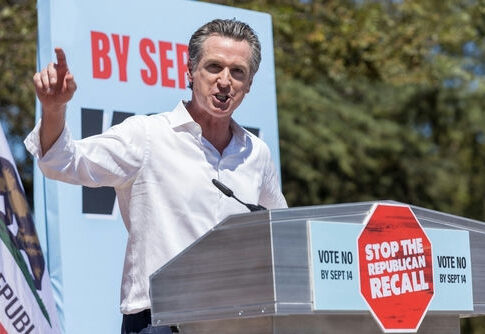In an unprecedented clash of wills, the Department of Defense has effectively dismantled California Governor Gavin Newsom’s criticism of National Guard deployment in Los Angeles, leaving many questioning his priorities.
Federal Intervention Sparks Political Firestorm
Protests erupted in Los Angeles on June 6, 2025, following Immigration and Customs Enforcement (ICE) raids. These raids targeted individuals allegedly involved in illegal immigration, reigniting tensions in a city with a storied history of civil unrest. As protests escalated into violence, President Trump stepped in, federalizing the California National Guard and deploying additional troops to restore order. This decisive action, however, was met with fierce opposition from Governor Gavin Newsom and Los Angeles Mayor Karen Bass, who accused the administration of inflaming the situation for political gain.
While the President aimed to address what he saw as local leadership’s incompetence, Newsom and Bass framed the federal response as an overreach, a breach of state sovereignty, and a catalyst for further unrest. Their criticism has been echoed by various community organizations and protest groups, who argue that the military presence only exacerbates tensions. Yet, many observers see the federal action as a necessary step to ensure public safety amid escalating violence, arson, and looting in the streets of Los Angeles.
Protests Expand Beyond Los Angeles
As the situation unfolded, the unrest in Los Angeles inspired similar anti-ICE protests across major U.S. cities, including New York, Chicago, and Dallas. These demonstrations, while initially peaceful, have occasionally turned violent, echoing the chaos seen in Los Angeles. Governor Newsom and Mayor Bass remain steadfast in their condemnation of the federal response, calling it inflammatory and counterproductive. Meanwhile, President Trump has continued to criticize California’s leadership, framing the unrest as evidence of failed Democratic governance and a lack of commitment to law and order.
A reporter asked Governor Newsom at a press conference Wednesday on whether the White House has indicated to him when they might consider pulling back the remaining 2,000 national guards. Newsom's response was as follows. https://t.co/aFA4nDc2mR pic.twitter.com/Qexo9LsPNc
— ABC7 News (@abc7newsbayarea) July 17, 2025
The ongoing protests have led to heightened security measures, including curfews and increased law enforcement presence in affected areas. Investigations into incidents of violence, property damage, and law enforcement conduct are underway, as both sides of the political aisle seek to leverage the situation to their advantage. The events in Los Angeles have become a focal point in the 2026 election cycle, with immigration policy and federal-state relations at the forefront of national discourse.
Long-Term Implications for Federal-State Relations
The deployment of the National Guard and Marines in Los Angeles raises significant questions about the future of federal-state relations in the United States. Legal scholars and civil rights advocates have expressed concerns over the federalization of the National Guard as a potential overreach of executive power. The situation highlights enduring tensions in American federalism, with the balance between security and civil liberties under intense scrutiny.
🚨BREAKING: Appeals court shuts down Gavin Newsom’s push to reclaim control of California’s National Guard from President Trump. pic.twitter.com/cQiUgrIS0B
— Benny Johnson (@bennyjohnson) June 20, 2025
Immigrant communities, already reeling from aggressive immigration enforcement, face increased fear and anxiety. The economic impact is also significant, with local businesses suffering losses due to property damage and disruptions. The crisis has deepened political, racial, and socioeconomic divisions, setting the stage for a contentious debate over the role of federal power in state affairs.
Sources:
Wikipedia: June 2025 Los Angeles protests
ABC News: Timeline of ICE raids and LA protests
CBS News: Maps and photos of LA ICE protests

